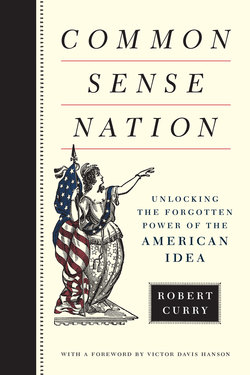Читать книгу Common Sense Nation - Robert Curry - Страница 11
На сайте Литреса книга снята с продажи.
ОглавлениеOVERTURE
Locke’s Revolution
“The supreme power in every commonwealth [is] but the joint power of every member of the society.”
—JOHN LOCKE, TWO TREATISES OF GOVERNMENT
No doubt this statement strikes you as merely a truism.
That it does is testimony to the influence of John Locke. It is very difficult for us today to comprehend how radical this claim was at the time it was made, and how dangerous it was for Locke to make it. In England, and elsewhere, the royal sovereign was the supreme power. For Locke to have simply linked his name to the statement, as I have done at the top of the page, would have meant his death.
In 1683, taking the unpublished manuscript of the Treatises with him, Locke managed to get himself smuggled out of England to safety in Holland. Agents of Charles II, who claimed absolute sovereignty by divine right, were in hot pursuit of him. The manuscript when eventually published contained this passage:
“Absolute monarchy is inconsistent with Civil Society, and so can be no form of Civil Government at all.”
Having such thoughts then could be fatal. If Locke had been caught, the king would not have needed the damning evidence of that manuscript. Locke had already become too closely associated with opposition to Charles’ rule to be safe in England.
Locke only returned to Britain when he escorted the princess of Orange from Holland to become Queen Mary. The Glorious Revolution of 1688 had put an end to the Stuart kings’ claim to absolute sovereignty by divine right, and established a monarchy of limited powers under William and Mary.
The Two Treatises of Government did not appear until 1690, and even then they were published anonymously. Locke only acknowledged his authorship in a codicil to his will. Although it had been written before the revolution, the preface claimed that the work was intended to justify Britain’s Glorious Revolution, “to establish the Throne of Our Great Restorer, our present King William; to make good his Title, in the Consent of the People.”
What was politically possible for revolution to achieve in Britain in 1688 was a monarchy of somewhat limited powers, limited at least by a Bill of Rights which guaranteed the people some basic protections from governmental power. When nearly a century later the Founders staked their lives, their fortunes and their sacred honor on the American bid for liberty, it was to Locke that the Founders turned to justify their right to revolution and to government by the consent of the people. However, very different circumstances made it possible for the Founders to go much further than what was accomplished by the Glorious Revolution. No doubt the Founders went even further than Locke imagined, but Locke had staked out the basis of their claim to liberty.
When independence was won, the American Founders did not follow the example of the Glorious Revolution by setting up a parliament and a monarchy in America. Much had happened in America by 1776 that explains the very different form of government that came out of the American Revolution.
A look into the colonial college named in honor of William and Mary can give us a clue about that different outcome. As a student at William and Mary, Thomas Jefferson came under the influence of William Small. Small, who mentored Jefferson during his time at college and afterwards, was a member in good standing of the Scottish Enlightenment. He came to America from Scotland to teach at William and Mary just in time to guide Jefferson’s studies there during the most intellectually influential years of Jefferson’s life.
In the same way, John Witherspoon, another full-fledged member of the Scottish Enlightenment, mentored James Madison at Princeton. In addition, the tutors who educated Jefferson and Madison before college were also Scots. All these Scots were part of a wave of scholars and clergy that brought the ideas of the Scottish Enlightenment to colonial America.
The Founders did not make George Washington a monarch, nor did they design a parliament on the British model. They did not provide for an aristocracy; in fact they ruled out an aristocracy. They also ruled out a politically empowered church allied with the government. The Founders made a radical break with the past. They set out to do what had not been done before: to design a system whereby the people of a geographically extended and diverse territory would govern themselves. They boldly went where none had gone before.
The Scots had provided the Founders with radically new ideas that were to enable them to fashion government along unprecedented lines—and to find a hitherto undreamed of way to realize Locke’s revolutionary claim that the supreme political power in every commonwealth is the people. When it came time to lay the foundation for the new nation and its government, the Founders went to work thoroughly grounded in the philosophical arguments the Scots advanced. It was those arguments that showed the Founders a way forward. It enabled them to go beyond the idea of a monarchy with its power somewhat limited by a Bill of Rights, and to make the American experiment in government by, for, and of the people.
